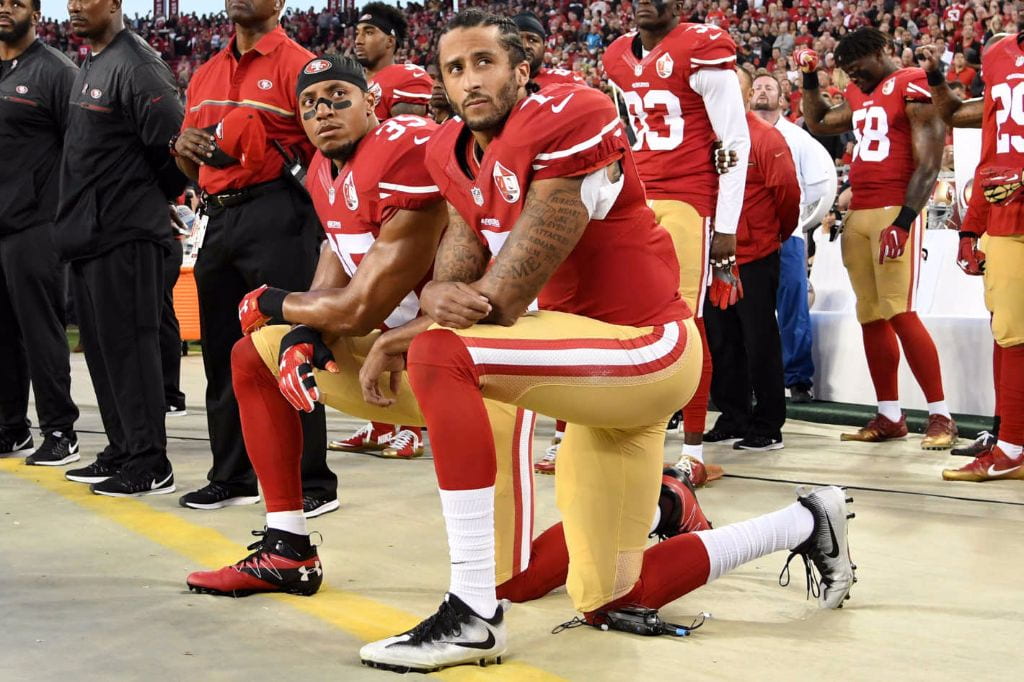BY: COLLEEN COYLE – STAFF WRITER
The year 2016 has been clouded by divisive politics during the vitriolic presidential campaigns of Hillary Rodham Clinton and Donald J. Trump. However, the bitter competition between the two nominees stems largely from broader issues America is facing and will continue beyond election day.
No aspect of American life has escaped the effects of the heightened political tensions, as it has infiltrated family relationships, friendships, and even national pastimes. The National Football League (NFL) is certainly not immune to these tensions, and the organization recently experienced massive amounts of media focus after the decision of 49ers quarterback, Colin Kaepernick, to kneel for the national anthem in honor of the Black Lives Matter Movement.
Kaepernick’s protest provoked a widespread backlash, causing fans to burn Kaepernick jerseys and share strong opinions on social media. However, Kaepernick’s protest is not a historically isolated event, especially in American sports.
Political protests in sports have been around long before Colin Kaepernick kneeled in response to the national anthem. Millennials have little memory of early civil rights protests by individuals like Jackie Robinson, Muhammad Ali, Tommie Smith, and John Carlos. Jackie Robinson’s political impact came simply by the fact that he was allowed to play at the highest levels of baseball. Muhammad Ali was banned from boxing and stripped of his title in 1967 because of his refusal to join the Vietnam War effort, citing religious reasons for refusal.
African American Olympic medalists Tommie Smith and John Carlos suffered similar consequences after their protests during the 1968 Olympic games. Smith and Carlos mounted the medalist podiums with fists raised to represent black unity, wearing black socks to represent black poverty, and black beads and a scarf to honor lynching victims. Both athletes were suspended and sent home from the Olympic games where they met massive national backlash and condemnation for their protests.
These political statements are nationally known, but are often forgotten during current discussions of Kaepernick’s own protest. Many members of the athletic community and American citizens refuse to acknowledge that Kaepernick’s protests are not standalone incidents, but are a continuation of a longstanding effort by the African American community to make their needs known to the rest of the nation. Efforts like Kaepernick’s expose the problematic claim that race is no longer an issue in America, despite the overwhelming evidence to the contrary.
Colin Kaepernick is not alone in his protests, as similar methods of protest have been used by other professional athletes in different sports. Lebron James, Dwayne Wade, and Megan Rapinoe are a handful of individual athletes that have taken to the playing field to protest racial inequality in recent times.
Additionally, whole teams of the WNBA have made clear where they stand—such as the Minnesota Lynx, New York Liberty, Indiana Fever, Washington Mystics, and Phoenix Mercury—by donning shirts that bear #blacklivesmatter and the names of black men and women whose lives have been wrongfully taken by police officers.
The protests in the athletic arena have received mostly national backlash and teams have been punished with fines and threats of suspension if they do not abandon their platforms. Despite the legal and peaceful nature of these protests, they have been met with responses of condemnation because much of America does not want to acknowledge that these athletes have legitimate reasons to be protesting.
How does this all relate to Centre? Why is this article appearing in our school newspaper? There are a few reasons. First, athletics play an important role in life and culture at Centre College and as students of a college that emphasizes global citizenship, it is our duty to educate ourselves about the events occurring outside of our own campus. Additionally, Centre is not immune from the conflicts arising on the national stage and affect us as an intellectual institution with a diverse population that deserves to be acknowledged.
Finally, I as a reporter and student recognize that not all our readers support Black Lives Matter or condone Kaepernick’s protests. However, this is an ongoing conversation that is complex and has no clear answer, but one that is necessary to move forward as a nation. Contrary to what some may claim, these movements are not isolated and this is not a “post-racial” America. Citizens, students, and human beings have an obligation to listen to the stories of these athletes, to educate ourselves, and to work towards solutions that reach all people.
